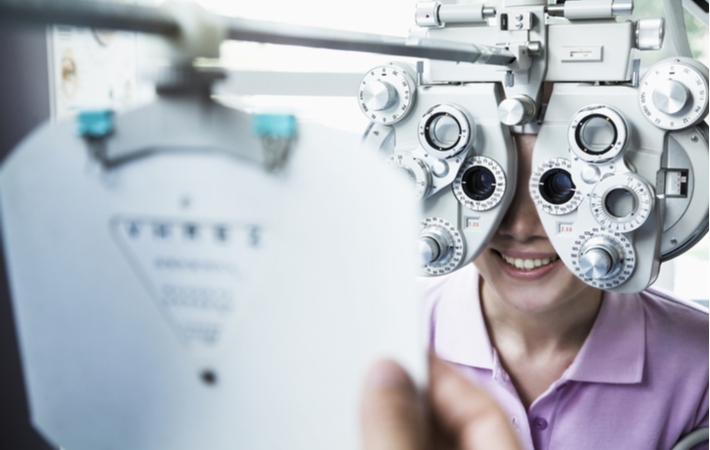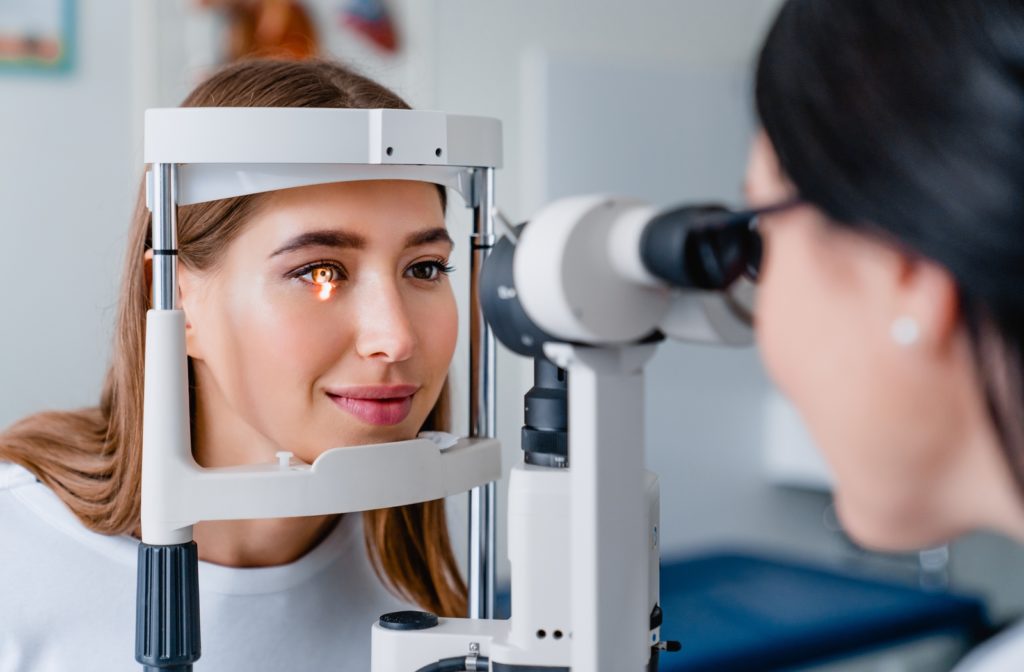Put an Eye Exam on the To-Do List
We all lead busy lives. Between family, friends, career, and personal goals, the more mundane tasks can pile up. With everything you have going on, do you really need to factor in regular eye exams?
The short answer? Yes. If you’ve been skipping your eye exams, this is your sign to book an appointment now.
The longer answer—which covers why you need an eye exam, what you can learn during an eye exam, and how often you should have an eye exam— can be found in our eye care blog. Read on to delve into the world of adult eye exams.
The Importance of Regular Eye Exams
The Eye Care Team professionals build their eye exams around 2 central pillars: education and prevention.
Not everyone has been taught about the necessity of regular eye exams for your overall health and wellness. Did you know eye exams can offer insight into conditions and diseases that affect the whole body?
On top of that, eye exams can catch eye diseases or vision problems that may have no outward signs or symptoms until vision loss or eye damage has already occurred. Don’t wait until something is wrong to see an eye doctor— in many cases, preventing eye conditions may be easier than treating them.
How Often Do Adults Need Eye Exams?
Adults & Young People
According to the American Optometric Association, adults and older teenagers (those who are no longer in school) should have an eye exam at least every 2 years.
Older Adults & Higher Risk Patients
Adults over 65 and anyone with a higher risk of ocular problems should come in for an eye exam every year to keep their vision in good shape and their eyes healthy.
High-risk eye patients include those:
- With a personal or family history of ocular disease
- Living with a chronic health condition that can affect the eyes
- Working a job that requires excellent vision or is particularly visually strenuous or hazardous
- Taking prescription medications that can affect vision
- Who wear contact lenses
- Who have had eye surgery or a previous eye injury
- Diagnosed with high or progressive refractive error
- Who have had laser eye surgery
Remember, your eye health and your partnership with your eye care team are as unique as your eyes are. These are just guidelines. Your optometrist may suggest a different exam schedule to meet your ocular needs.

What to Expect from Your Eye Exam
The field of optometry is constantly evolving with new research and discoveries. Optometrists have excellent technology at their fingertips to help make eye exams simple. Some tests are high-tech and new, and some are optometry staples that have been tried and tested for years, but all the tests are run to offer you a better picture of your eye health.
When you have your eyes examined, there are some likely steps you’ll encounter, including:
- Having your case history taken. Knowing your medical history will allow your optometrist to build a more complete picture of your eye health.
- A visual field test. Visual field tests measure the sensitivity and scope of your central and peripheral vision.
- A Snellen chart. Snellen charts are the classic eye charts with letters from large to small that help fine-tune your prescription.
- Ocular coherence tomography (OCT). Ocular coherence tomography (OCT) builds an image of the retina and the interior of your eye.
When to Come in Early
It can be tempting to wait until your next regular appointment to bring up a list of vision concerns. However, there are certain eye conditions and symptoms that you should address as soon as possible. Eye emergencies can endanger your vision, and quick treatment may be the key to maintaining your eye health.
Signs and symptoms of an eye emergency can include:
- Sudden vision loss
- Eye pain
- Sudden onset of floaters & flashes
- Sudden blurred vision
- Corneal abrasion
- Chemical contact
- A foreign object in your eye
- Significant eye discharge
- Tunnel vision
- Dark spots in your visual field
When in doubt, contact your optometrist, who can suggest your next steps.
Your Vision is Priceless
It pays to be diligent in protecting your sight—you only get one pair of eyes, so taking care of them is a worthwhile investment. If eye exam cost is a concern for you, discuss payment options with your clinic and see if they accept insurance.
The Eye Care Team offers direct billing to many different insurance providers. Help keep your eyes healthy and stay on budget by allowing insurance to pick up part of the tab.
Eye Exams for Everyone
Everyone needs regular eye exams, and there are specialty eye exams available to meet different needs. Many optometrists offer children’s eye exams, diabetic eye exams, and eye exams for contact lenses.
Don’t worry if it’s been a while since your last exam. Your optometrist is here to give you the best possible eye care they can provide. Add an eye exam to your calendar, and fill in another piece of your personal health and wellness puzzle.



